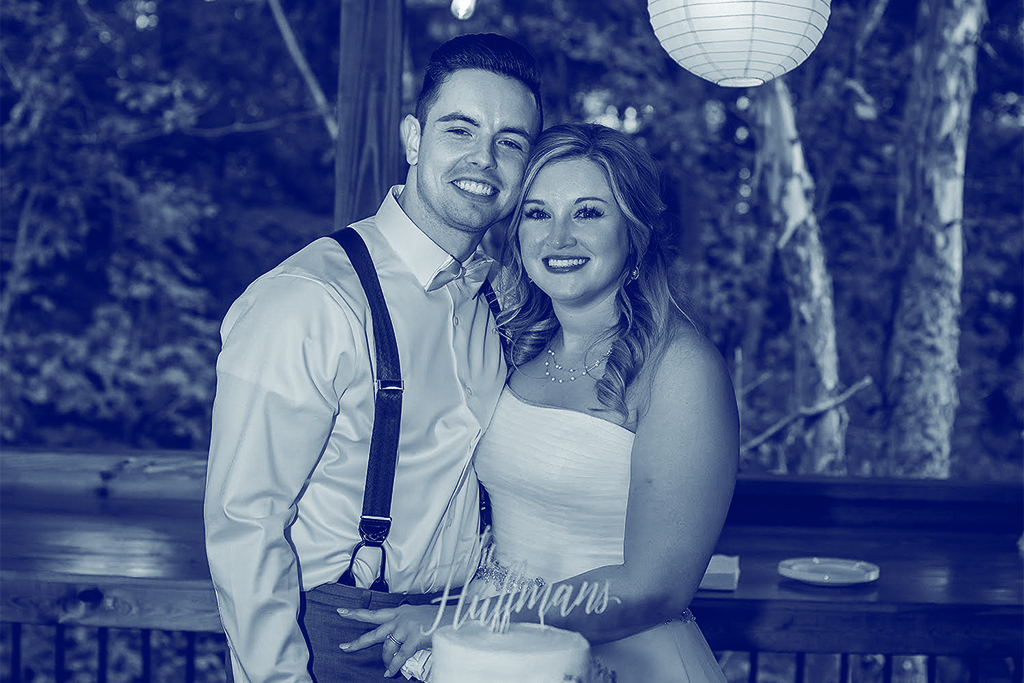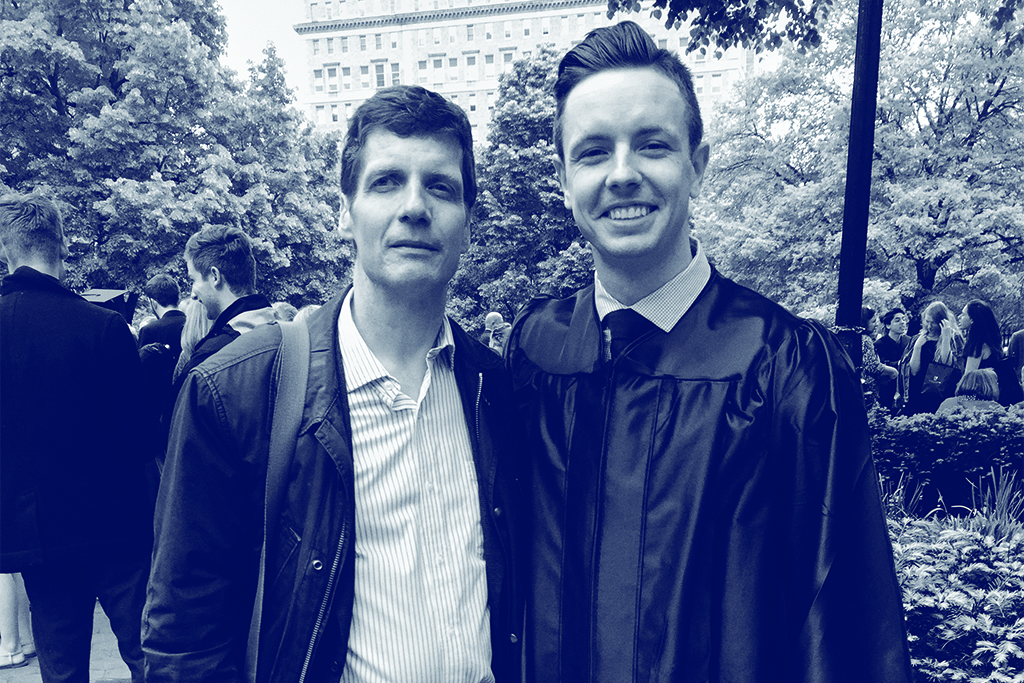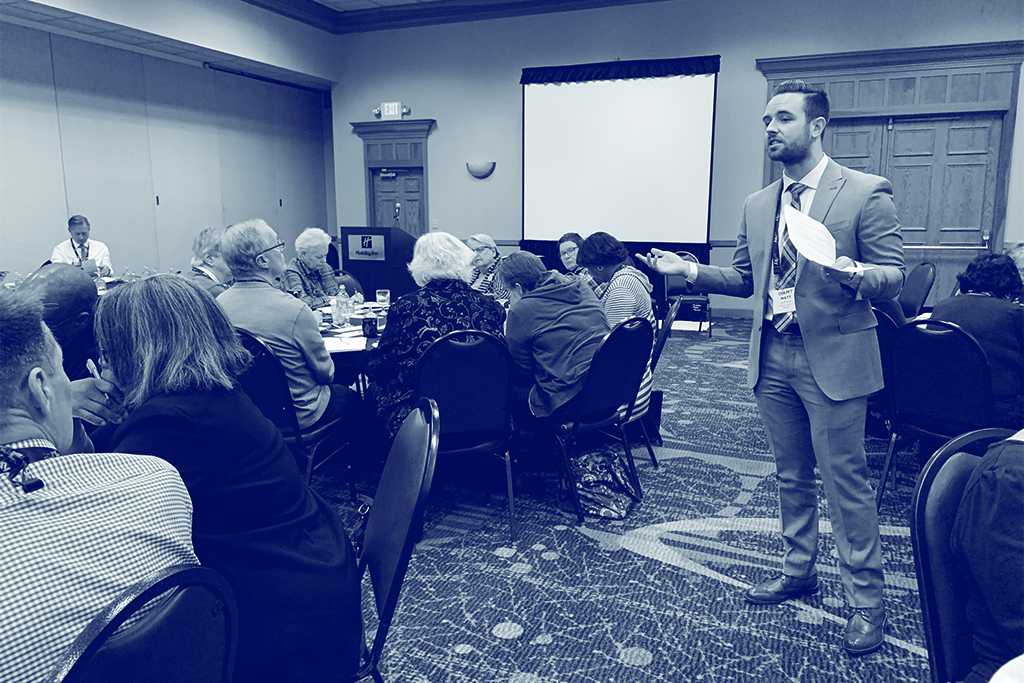Let Me Wake Up
Once seeing God as a judge, Matt Huffman had no reason to give up drugs and wanted to die. But seeing Him as loving and caring gave him new motivation and purpose for life.

Every Friday evening, Matt Huffman (PPE ’17), 32, drives to a church just outside Lexington, Ky.. He walks across the parking lot, opens the door to a small building, and is instantly bombarded with hugs on his way to the coffee pot. Many of the people in the room attended Huffman’s wedding last year in August. Like a normal church gathering, there are groups of people standing around chatting, some of them as old as 60, some as young as 18, most sipping cups of free coffee.
After everyone gets settled, Huffman sits in the front of the room and begins the meeting with a confession: “My name is Matt, and I’m an addict.” After years of using drugs to feel good, Huffman’s life changed after his family intervened and he saw God through the lens of love, not judgment. Now married and settled in Lexington, he’s organized his life, not around feeling good, but around serving people.
Huffman’s dependence on substances started not long before he moved to New York in 2006 for school at King’s. Like alcohol, which Huffman had started consuming in high school, drugs made him feel safe and present in the moment. He had always struggled with feeling like something was off with himself, “like a picture hanging on the wall,” he recalled. “A little bit crooked.” Drinking and drugs shut off the “never-ending critic” in Huffman’s head that would constantly tell him he was not enough. At the time, he saw God as a judge: a rewarder of good people and a punisher of bad. Terrified of judgment from God and others if they should find out, he hid his habit from his church friends and parents.
Once at King’s, Huffman tried to comply with the Honor Code, but found it nearly impossible to not return to the feeling alcohol offered. He found his first drink at an upperclassman party near the end of his first semester. During his sophomore year, he began smoking weed and using cocaine. There were friends who tried to help him give up substance use, but he pushed away anyone who wouldn’t condone his behavior. Huffman’s grades started to slip and his friendships disappeared. “I isolated myself to where ultimately the only people I was around were people that would co-sign my B.S. and who wouldn’t judge me for essentially trying to kill myself.”
The habit worsened. During the summer of 2008, Huffman tried Percocet. While weed, booze, and cocaine had seemed to ease his restlessness, Percocet felt “like breathing for the first time.” The following summer, while back home in Kentucky, Huffman developed an addiction to “hillbilly heroin”—what they call OxyContin in Kentucky, Percocet’s more potent, more expensive cousin.
In August of 2009, Huffman returned to King’s for what was supposed to be his senior year. But because he had been academically withdrawn from several classes due to too many absences, he couldn’t graduate until 2011. For those next two years, his life was defined by his addiction. If he wasn’t in class, he was doing drugs, on his way to buy drugs, or doing whatever it took to get drugs. Huffman was completely broke because all of his money went to booze, weed, and oxy, if he could afford it. At different times, he was homeless, unable to make rent, but still attending classes. When he couldn’t afford drugs, Huffman would get the shakes, throw up, and ache all over. When he had it, he could go to class and function like his classmates.
Huffman had cut all ties at school so few people noticed when he wasn’t in class. Whenever his mom, Susan, called, he would make up crazy excuses for why he was being academically withdrawn from classes, why he was broke, and why he had been kicked out of his apartment. Desperate for money, he started scamming other users by posting ads on Craigslist, promising tablets of Percocet for cash. When people agreed to buy, he would put a handful of tablets of Tylenol into a black bag, meet them in a public place, and insist on receiving cash before handing over the “drugs.” He would insist that the customer could only open the bag in a nearby alleyway, alone. When he or she walked to a corner, Huffman would bolt, praying the customer wouldn’t catch, or worse, shoot him. Some-
times people would text and call him for months after he scammed them, sending ominous
messages like, “I’m behind you” when actually they weren’t.
But sometimes he would get caught. One time, a woman and a big athletic man pulled up for a purchase in Brooklyn’s Marcy projects. Huffman tried to use his usual tactic, but after he handed the woman the bag, she immediately opened. He walked away as fast as possible. The woman began screaming, “He ripped us off!” and the big guy came sprinting. Huffman, not in any shape to race him, was finally caught after ten minutes of ducking around corners. Exhausted, he gave up, threw the money on the ground, and waited to be stabbed. Luckily, when the buyer realized there was no Percocet, he took the money and walked away. Huffman felt miserable. The worst part, he remembers, is that he would have to do the whole thing again that night if he wanted to avoid feeling deathly sick from withdrawals.
In 2011, Huffman was only a few months from graduating. He’d moved back on campus and was living at the Ludlow apartments. He had already been to two Honor Councils by this point, the first for drinking as a freshman, and the second for having weed in his apartment on campus. Huffman was good at hiding the secret life he was living, but during one fateful room check, his chamberlain found weed on his desk and that was strike three. Huffman was sent home to Kentucky and not allowed to finish his senior year.
Over the next three years, Huffman tried to overcome his addictions. He had an on-again-off-again relationship with heroin, and would do cocaine, smoke weed, and drink to help himself cope. His mom and Huffman’s brother didn’t find out about his drug problem until they found him overdosed on heroin in his bedroom. Most of the time, Huffman felt like he wanted to die. It would be so much easier, he thought. But addiction kept winning.
One night in 2015, Huffman overdosed while doing heroin with friends. He passed out and the people using with him, instead of calling 911, put him in a car, drove it up the street, and left him on the side of the road. He would have died that night if a cop had not walked up at two in the morning to check on the vehicle. Finding the car registration in Susan’s name, the cop called the number listed. Answering the phone, Susan felt sick to her stomach as the cop described the unconscious man in the car. “He’s got long hair and a beard,” the cop said. Matt doesn’t have long hair or a beard, she thought. “That can’t be him,” Susan said. The cop then spotted a tattoo and read it to Susan: “Mama you been on my mind.” Susan knew immediately it was her son, his tattoo quoting a Bob Dylan song. Her heart dropped. The cop rushed Huffman to the hospital where he nearly died, flatlining several times before finally stabilizing.
Huffman’s parents realized it was time for an intervention. Days later, they invited him to a friend’s house where they, and his older brother Chase, were waiting. Sitting there alone on a three-person couch, Huffman didn’t realize that he was in an intervention until his mom started talking. “You are out of control,” she said. “You are going to die.” He dropped his head into his hands, realizing the toll his life was taking on his family. Susan told him they were sending him to a correctional facility in Florida called WestCare. Huffman agreed—a few months of rent-free living on the beach didn’t sound too bad. He wanted to appease his parents and more importantly, he was ready to try something different. Four days later, he was on a flight to Florida.
In the shuttle on the way from the airport to the facility, it dawned on Huffman what was happening. For the next several months, he would have no phone and no drugs. Stopping at a gas station, the shuttle driver handed Huffman his cell phone so he could call his parents while he went in to grab a snack. Holding the iPhone, Huffman immediately thought, “Run.” He could sell the phone, buy some drugs, and live in Florida. But something stopped him. “I know the misery and pain and shame if I do that,” he thought. “I don’t know what it feels like to do something different. Let’s try this.” That day was April 13, 2015.
Huffman stayed at WestCare for eleven months. The first month and a half were the hardest. At night, Huffman would be up for hours in pain as his body went through extreme withdrawals. He would only be able to fall asleep by reminding himself that he could always kill himself if this
didn’t work. He would often fall asleep begging God, “Please don’t let me wake up.”
One night, Huffman had a dream that felt like real life. He was at a party in a drug house. Needles and bottles were scattered on the floor. Huffman asked someone what year it was. “2016,” they replied. Huffman was overcome with emotion as he realized he’d just wasted another full year addicted to drugs. He closed his eyes and started saying a different mantra, over and over again: “Please let me wake up. Please let me wake up.” For the first time in years, Huffman wanted to be alive. After this dream, Huffman started to see God differently, as loving and caring, not only as a judge, and began reading his Bible through this new lens.
Nine months into his time at WestCare, Huffman called The King’s College, telling them he was clean and that he wanted to finish his degree. After a committee came together and voted in favor of him being allowed to return, Huffman was invited back. The classes he needed, however, were only being offered in the spring. Two months later, he was released from WestCare and returned to Lexington where he worked, saved money, and started attending a Friday night 12-Step meeting, the same group he attends today. Through this group, God’s grace became real to Him as it had never been before.
Back at King’s nearly a year later, Huffman reconnected with professors and former classmates who were now staff members. Determined to experience New York differently this time around, he found and joined a 12-Step group in Harlem. After years of feeling that he would never graduate college, Huffman was immensely grateful for his new chance. He worked hard in classes and earned straight A’s in his final semester.
After graduating, Huffman moved back to Lexington where, in 2018, he took a job with Building a United Interfaith in Lexington through Direct-Action (BUILD) working as an associate organizer. BUILD is an organization of 26 churches in the Lexington area who come together to address local issues in the community through education, research, training, and action. Huffman’s job is to develop relationships with congregants and clergy of these churches, and train them how to communicate better with public officials.
But the highlight of his week is when he pulls up to the church, walks across the parking lot and sits in a room full of recovering drug addicts. These are his closest friends, and the group is a constant reminder of where he came from and where he never wants to return. They are also a reminder of God’s power and grace to transform lives.
Not long from now, Huffman will be celebrating five years clean with this group. Looking back, Huffman reflects on how, for so long, he chased things that made him feel good. “I chased it to its bitter end,” he said. “It was the emptiest, darkest place I’ve ever been.” Now, even when he works 70 hour weeks with BUILD, he’s found true peace and fulfillment. “Loving God and loving my neighbor, it doesn’t always feel good, but in it I’ve found fulfillment, peace, and joy,” he says. “I don’t want to live in service of myself, I want to live in service to others.”






